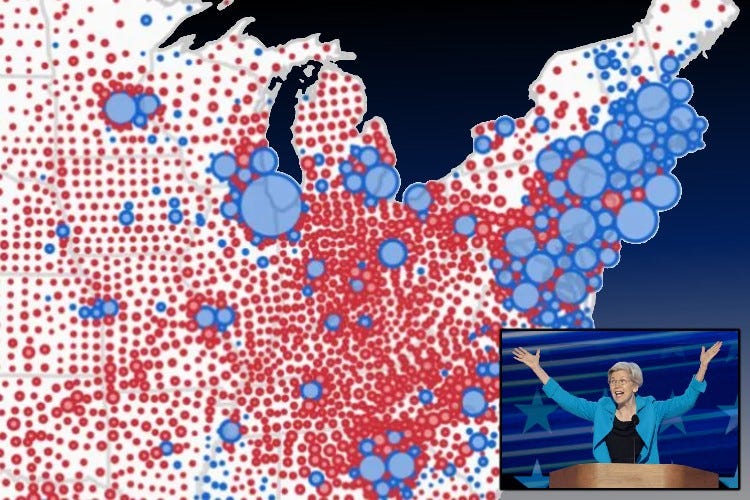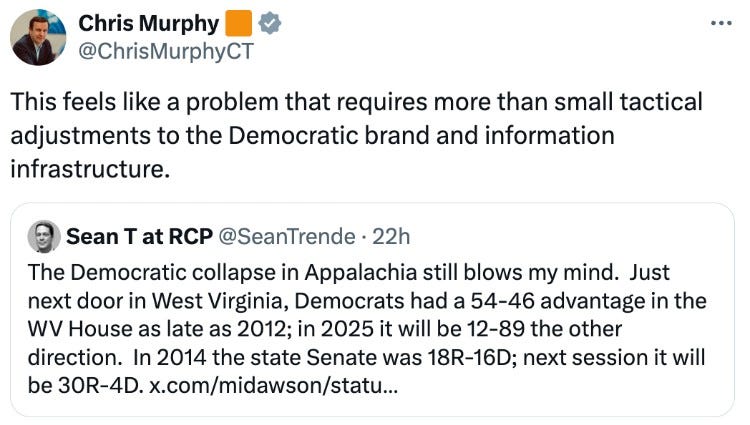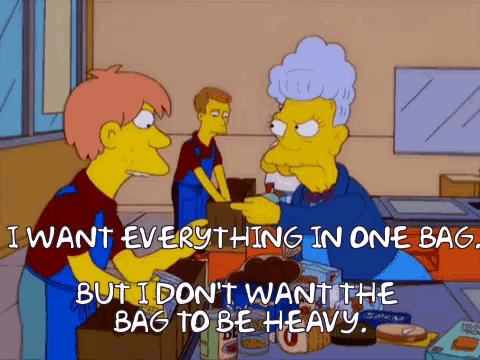
Democrats are shockingly unpopular in Appalachia. If you’d like some numbers to back up that obvious fact, here you go: Republicans have an 89-12 advantage in the West Virginia House and a 30-4 advantage in the Senate, though as recently as 2012, Democrats had a majority in the House and were almost even in the Senate. Sherrod Brown — who just lost re-election — saw Eastern Ohio go from deep blue to deep red in his four Senate races. There are more numbers where those came from, but do you really need them? Democrats are not popular in Appalachia, Derek Jeter is not popular in Boston, Old Milwaukee is not popular in France — these things could be backed by data but how ‘bout we save time and just assume that these obviously true things are true?
What could be done about this? It’s hard to say. Unless you’re Connecticut Senator Chris Murphy, who responded to the numbers I cited above with this tweet:
We know that Murphy is arguing for a major realignment of the Democratic brand towards economic populism because he’s been pushing loudly for that since the election. And recently, he laid out his case in a memo addressed to “Interested Democrats” (like me!) called “Taking on Corporate Power Sells Everywhere”. In that memo, Murphy shared findings from his internal re-election polling in Connecticut. Those findings include:
82% of respondents either strongly or somewhat agree that one of the biggest problems facing America today is that a handful of corporations and economic elites have too much power and the government is doing too little about it.
88% of respondents either strongly or somewhat agree that a handful of enormous multinational corporations wield a massive amount of influence over the quality of our lives without accountability or transparency to the public.
80% of respondents either strongly or somewhat agree that the speed of technological change is dangerous and government needs to step in to regulate against abuses by the big, profit-driven technology companies.
So, some things about these findings. First: The polling was done in Connecticut. Here’s my cloud of words I associate with Connecticut, which is probably similar to the word cloud that many people in Appalachia would come up with:
My point: I just don’t know how well data from Connecticut translates to the rest of the country. Though I’ll concede that it’s certainly possible that these poll questions would get similar responses elsewhere, because the questions are absurdly slanted.
Look at the word choices: “enormous multinational corporations”, “economic elites”, “big, profit-driven technology companies” — these questions are taking voters by the hand and leading them to a specific answer. It’s like asking voters: “Do you think education should be run by folks in your neighborhood or by bureaucrats far away in Washington?” Or how about: “Should veterans be given the best health care money can buy, or warehoused in piss-smelling flop houses where they battle feral dogs for scraps?” This is not serious polling — this is worthless slant-polling, probably by a consulting firm that just ripped off Chris Murphy for a bunch of money.
And even if people hold some populist sentiments — which they might — it’s another thing to assume that those opinions are strongly held and will determine how people vote. If voters are motivated to lash back against economic elites, then they’ve been keeping that fact to themselves when answering exit polls: Those polls found that in 2024, people cared most about inflation, immigration, and transgender issues. If voters are motivated by economic populism, it’s also unclear why they just elected a rich1 businessman who cut taxes for the wealthy and corporations in his first term and who famously played an elite asshole who enjoyed firing people on TV. Murphy’s poll questions were so slanted that they probably elicited a lot of “yeah, sure” responses that don’t reflect deeply held convictions.
I’m not exactly sure what actions Chris Murphy thinks should result from the deep well of economic populism that he’s certain exists. Sometimes I think he just wants Democrats to say the words “corporations” and “billionaires” a lot, and if that’s the plan…sure, fine, whatever. Might help a bit. Then again, it might not — I feel like Democrats have railed against corporations and billionaires a lot. The rhetoric in the 2020 primary made Das Kapital sound like Atlas Shrugged, but a populist uprising did not ensue, and in fact, voters elected the one candidate who was so old that he literally forgot to talk like that.
When Murphy dips his toe into policy — which is rare, because he mostly talks in abstractions — he sounds a lot like Elizabeth Warren. He’s big on antitrust policy and skeptical about trade. He’s been boosted by groups that support the ten percent cap on credit card interest that Warren, Bernie, and Trump support, though I haven’t heard Murphy talk about that himself. I can’t tell if Murphy backs a Warren/Sanders-type agenda or if he just wants to borrow their rhetoric, but he clearly thinks that the fire breathing populism that people like Warren and Sanders have made their brand will solve Democrats’ problems in parts of the country that are shifting red.
And maybe he’s right! Maybe voters feel strongly about the Consumer Financial Protection Bureau; maybe they really want Lina Kahn to remain as chair of the FTC. Maybe they believe that the consumer welfare standard is the wrong prism through which to view corporate mergers, and that a more holistic approach is needed. Maybe they’re dying for a wealth tax, especially a mark-to-market tax on unrealized capital gains, and are also supportive of higher taxes, generally. Maybe they love the use of campus radical buzzwords like “neoliberal” and agree with Murphy that student loan forgiveness was “good policy”. Maybe they’ve been heavily influenced by the work of Piketty, Saez, and Zucman, and worry that the consolidation of corporate power is ushering in a new Gilded Age.
Or — for the sake of argument — maybe they don’t give a shit about any of that. Maybe the belief that voters secretly hold Sinclair Lewis-esque economic views is a tragic misread by a badly out-of-touch Northeastern Senator. Maybe this is like in the late 2010s, when leftists seized on a few shitty polls to convince themselves that Americans were champing at the bit for Medicare For All. Maybe the balance of evidence suggests that voters’ opinions of the Warren/Sanders agenda lies somewhere between “dislike” and “don’t care”, and that populists tend to underperform normie Democrats even in deep blue states. Maybe “socialism” is one of the most toxic words in American politics, and that’s why Republicans constantly try to pin that label on Democrats, and maybe voters don’t back a crusading regulatory agenda because they hate Washington, bureaucrats, and Washington bureaucrats. Maybe the truth is that voters only care about economic outcomes, not policies, and that I correctly summarized their views on this blog two weeks ago when I wrote: “Voters don’t care how you land the plane as long as you get the motherfucker on the ground, wheels-first.”
I’m being harsh because I think Murphy is egregiously, disastrously wrong. Though, the first part of his narrative is surely correct: Murphy believes that liberals/progressives are culturally out of step with many Americans. And I agree — most people think we are annoying freaks. My suggestion is that we stop being annoying freaks. Murphy’s suggestion is that we get people to ignore cultural issues by pivoting to economic populism, which is surely what voters actually want — after all, did you see the answers they gave to his piece-of-shit polls? Murphy is right in his diagnosis but grievously wrong in his prescription — he has identified the patient’s cancer and is prescribing a strict regimen of crack cocaine and asbestos exposure.
Ironically, I’d argue that left-wing populism is, itself, something of an elitist opinion these days. Most working class people don’t romanticize the New Deal, nor do they use phrases like “neoliberal economic order”, like Murphy does. The Democratic Socialists of America is populated mostly by grad students and online weirdos, not denim-clad union types. Not only would backing the dumb parts of the Warren/Sanders agenda2 worsen the economic conditions that voters actually care about; sounding too much like a university Marxist will actually increase the cultural distance between Democrats and most Americans. Murphy is right that Democrats need to listen to voters, but I think he’s simply hearing what he wants to hear.
I’m actually not certain that Trump is rich — there’s circumstantial evidence suggesting that he might be drowning in debt. We don’t know. But people certainly think that he’s rich.
A full breakdown of what I consider the good parts and bad parts of the Warren/Sanders agenda will have to wait for another day, but suffice it to say: I think active antitrust policy and narrowly-tailored consumer protections are good, and I think that trade restrictions and price controls are bad.









As a resident of Maryland (that famous swing state), I find restraining corporate power appealing. But as an erstwhile Republican, I’d suggest making the case for it in more patriotic, capitalist terms: Make our markets free again! Big corporations buy off the refs so they don’t have to compete. Freedom isn’t free; we need police in our markets as much as on our streets, and sometimes you have to wage a trade war abroad to secure free markets at home.
I asked five of my PhD colleagues, and four of them agreed this is an appealing pitch. Since they all own vacation homes in West Virginia, I’m confident 80% of Appalachians would back it, too.
Speaking as a lifelong Independent, rabidly anti-Trump, viciously anti-MAGA, and since 2016 absolutely anti-Republican voter and a now-retired working class / union guy, born and raised in an Appalachian state and having spent 5 decades of his adult life making a living as a journeyman skilled tradesman in a Rust Belt state both directly in and sometimes around the domestic American auto industry...
The Democratic Party in general and those in it like Chris Murphy in particular are as blind and tone deaf as a fucking rock at the bottom of a very deep well when it comes to them recognizing what rural and / or working-class people think about Democrats in general and the elites in the national party in particular these days and why they think that way.
Identity politics, blatantly woke bullshit, academic social theory and cultural clap trap doesn't play well either in Appalachia or on the factory floor, or in some steamy big city / small town restaurant kitchen that's somewhere in between. And neither does thin-to-vanishing lip service to working class ideals like fairness and merit, self-reliance and individual responsibility.
Are there racists and bigots and malign actors in Appalachia and in the working class? Well, duh.
But when a working-class stiff looks at another working-class stiff, or when an actual hillbilly, and not some faux version that writes about them in best selling media-dazzling scams, looks at another hillbilly, the first thing he sees is a goddamned working-class stiff or hillbilly, not someone with a different dose of melanin in their skin cells or a different sex drive in their trousers, or cultural heritage in their id or more or less formal education than he might have himself. He sees *himself* before - and sometimes even more - than he sees "the other".
Until he looks and listens to someone like Chris Murphy, who soon becomes something other than relatable and believable because he's too far removed from the realities of the everyday working-class world and rural life and tries to bridge the divide with language that plain-talking working-class / rural schmoes largely like me largely do not understand nor relate to in the least.
So. My advice to Murphy et al would be to climb out of the fucking well and go and get not your hands and fingernails but your ears dirty for a good long while by actually *listening* to working-class and rural people tell you what's important to *them*, all the while refraining from indulging the overpowering urge for you to tell them what *you* think is important.
Until you're willing to do that and to actually learn from it, Chris my boy, the working-class and hillbillies everywhere are going to continue to tell you to kiss their collective asses.